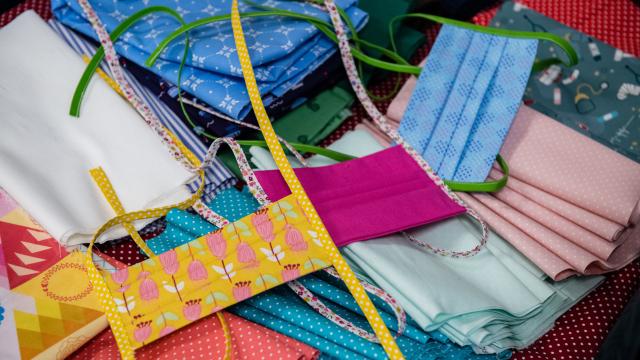There is no single solution or policy that will get us through this coronavirus pandemic, but there is one thing that every American should be doing if possible, and that’s wearing a face mask whenever you’re likely to come into contact with others.
Soon after the first known cases of covid-19 were reported in China and elsewhere in January, people were understandably curious about the usefulness of face masks for stopping its spread. Writing about this topic in late January, I tried to be as accurate as possible in addressing the question, given the available evidence and public health consensus at the time.
I noted there was solid evidence for face masks helping stop the spread of the flu but mixed evidence when it came to coronaviruses like SARS—a close relative of the virus behind covid-19, known as SARS-CoV-2. Respirator masks like the N95 can filter out breathable germs but have drawbacks, namely that they’re hard to wear for very long and aren’t well-fitted for people with facial hair and small children. These are the primary masks a healthy person would wear to prevent catching an illness from others. Surgical masks, the sort you’d normally see in a hospital, are easier to use but are typically worn by sick people in an effort to avoid infecting others.
Ultimately, both I and most of the experts I spoke to at the time agreed that face masks were better than doing nothing. That said, I also wrongly argued the virus was a “largely abstract” threat to people in the U.S., based on the small number of reported cases at the time, all linked to travel. Scientists now think the virus was already locally circulating in the country by mid-January, and since-disclosed reports created within the U.S. government at the time have also concluded as much.
But some official and public health authorities (and media outlets) took a far more sceptical stance. They recommended against the general public buying and wearing masks, especially if they weren’t showing any symptoms. As recently as early March, U.S. Surgeon General Jerome Adams warned that wearing masks could actually increase the risk of catching the virus. Alongside these warnings, they also maintained that masks were in short supply for the health care workers who needed them most because of the public’s hoarding of them, a contradictory message, to say the least.
It’s certainly possible these authorities cynically lied to the public about how useful these masks were, in hopes of preserving the supply for health care workers. But it’s also true that some relevant assumptions about the virus have changed over the months. We now know the virus can spread before people start feeling sick and may even spread from people who never feel sick at all. So simply not feeling sick isn’t a guarantee that you’re not contagious. If people can be contagious without knowing it, then it makes sense for everyone to wear a mask whether they feel sick or not.
[referenced url=” thumb=” title=” excerpt=”]
We’re also getting more evidence for the benefits of mask-wearing. Places whose governments did encourage mask-wearing among the public early on in their respective outbreaks, such as Taiwan and South Korea, have consistently handled the coronavirus better than others, with fewer reported cases. Research published today in Nature Medicine found evidence in the lab using human volunteers that face masks can reduce the transmission of flu and seasonal coronaviruses.
These bits of evidence have their caveats, like anything else. Everyone in South Korea can now easily wear masks because their government quickly marshalled its resources and power over private companies to mass-produce them. That same urgency also led to the widespread testing of its population and the aggressive tracking and isolation of cases before they got out of hand (an already established universal health care system didn’t hurt, either). Contrast that with the U.S. federal government, which spent months minimising the problem and delaying aggressive actions to slow the spread of the virus, while not doing enough to ramp up the country’s testing capability, which is still lagging behind other countries.
In that sense, it could be that universal mask-wearing is more a sign of a country’s strong response to the virus than a leading cause for its success. But the evidence we have supports wearing a mask while in public, whether you are sick or not. You should still avoid touching your face, frequently wash or sanitize your hands, and of course stay home as much as possible.
People have shared instructions for how to make your own masks and reuse them safely (companies and hospitals are also developing ways to reuse and sterilise existing masks). And there is research suggesting that even masks made from a cotton T-shirt provide some protection against respiratory viruses, though to a lesser extent than surgical masks.
On Friday afternoon, President Trump said that the CDC is now recommending the public wear cloth masks, though he said he didn’t plan to wear one himself. Don’t be like Trump; wear a mask when you’re outside to help stop the spread of this virus.
